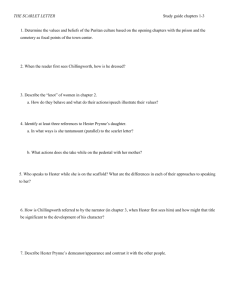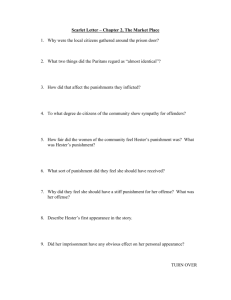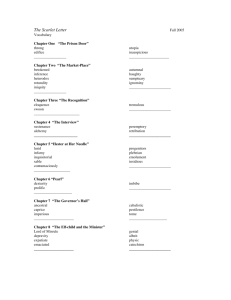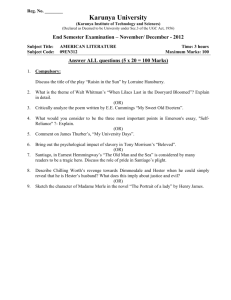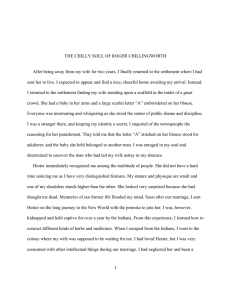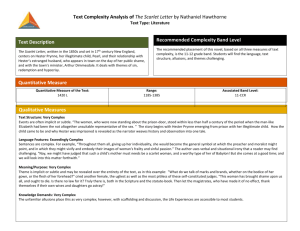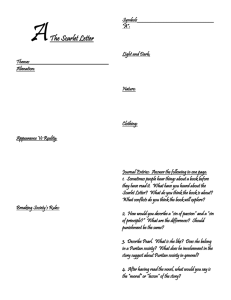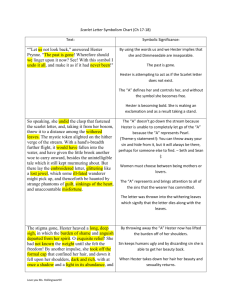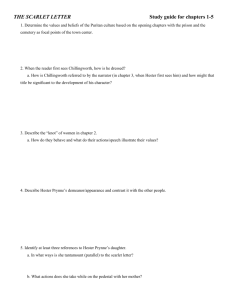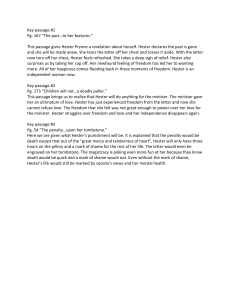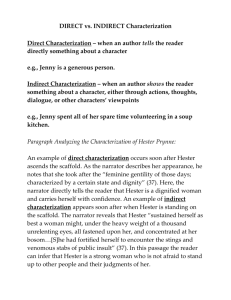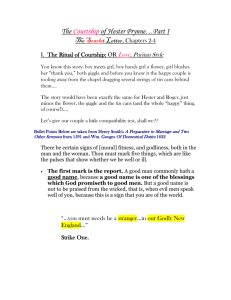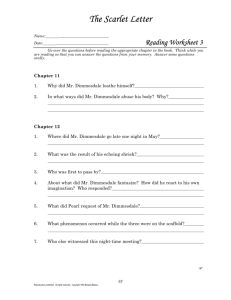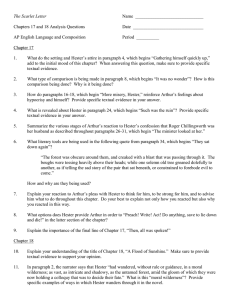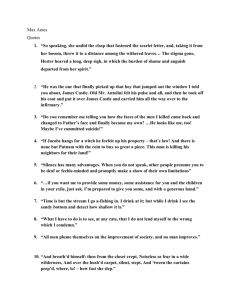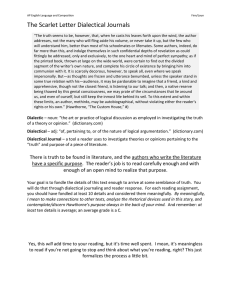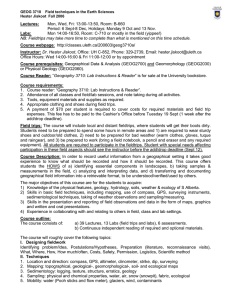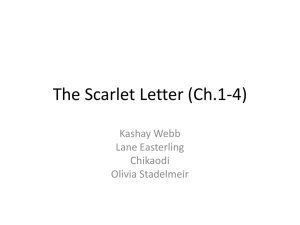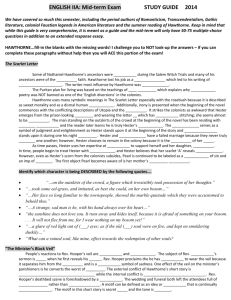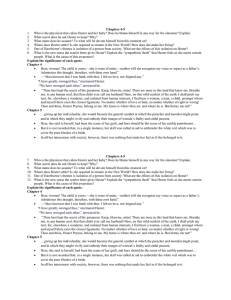First Half of “The Wife's Story” (pp. 44-55) Considerations Pre
advertisement
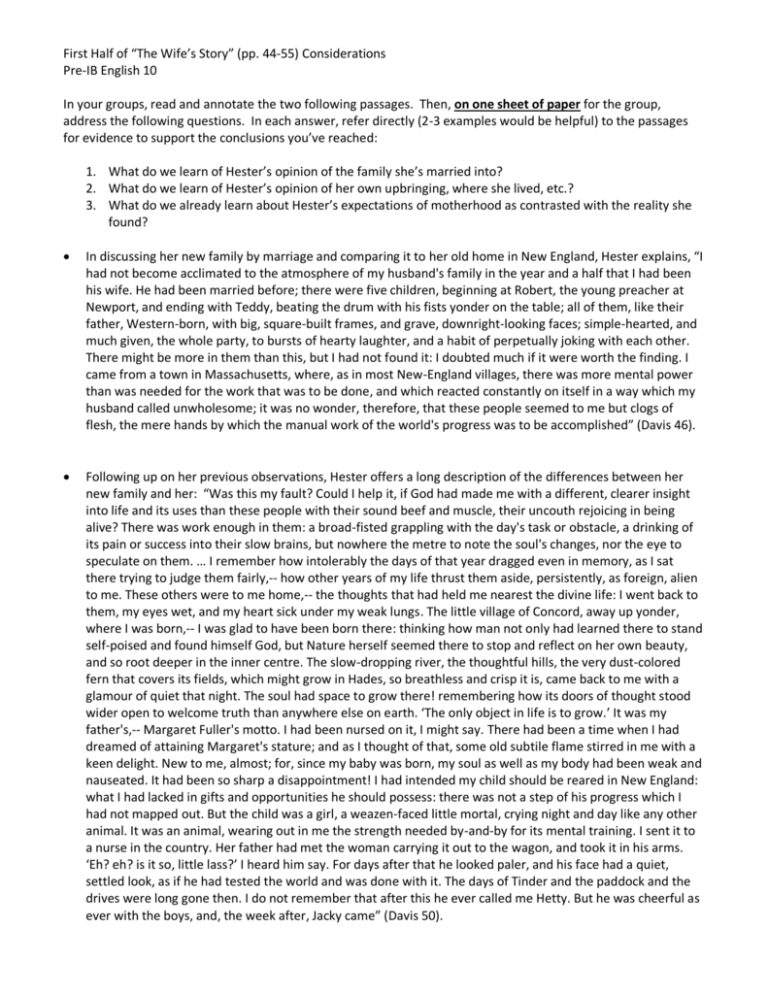
First Half of “The Wife’s Story” (pp. 44-55) Considerations Pre-IB English 10 In your groups, read and annotate the two following passages. Then, on one sheet of paper for the group, address the following questions. In each answer, refer directly (2-3 examples would be helpful) to the passages for evidence to support the conclusions you’ve reached: 1. What do we learn of Hester’s opinion of the family she’s married into? 2. What do we learn of Hester’s opinion of her own upbringing, where she lived, etc.? 3. What do we already learn about Hester’s expectations of motherhood as contrasted with the reality she found? In discussing her new family by marriage and comparing it to her old home in New England, Hester explains, “I had not become acclimated to the atmosphere of my husband's family in the year and a half that I had been his wife. He had been married before; there were five children, beginning at Robert, the young preacher at Newport, and ending with Teddy, beating the drum with his fists yonder on the table; all of them, like their father, Western-born, with big, square-built frames, and grave, downright-looking faces; simple-hearted, and much given, the whole party, to bursts of hearty laughter, and a habit of perpetually joking with each other. There might be more in them than this, but I had not found it: I doubted much if it were worth the finding. I came from a town in Massachusetts, where, as in most New-England villages, there was more mental power than was needed for the work that was to be done, and which reacted constantly on itself in a way which my husband called unwholesome; it was no wonder, therefore, that these people seemed to me but clogs of flesh, the mere hands by which the manual work of the world's progress was to be accomplished” (Davis 46). Following up on her previous observations, Hester offers a long description of the differences between her new family and her: “Was this my fault? Could I help it, if God had made me with a different, clearer insight into life and its uses than these people with their sound beef and muscle, their uncouth rejoicing in being alive? There was work enough in them: a broad-fisted grappling with the day's task or obstacle, a drinking of its pain or success into their slow brains, but nowhere the metre to note the soul's changes, nor the eye to speculate on them. … I remember how intolerably the days of that year dragged even in memory, as I sat there trying to judge them fairly,-- how other years of my life thrust them aside, persistently, as foreign, alien to me. These others were to me home,-- the thoughts that had held me nearest the divine life: I went back to them, my eyes wet, and my heart sick under my weak lungs. The little village of Concord, away up yonder, where I was born,-- I was glad to have been born there: thinking how man not only had learned there to stand self-poised and found himself God, but Nature herself seemed there to stop and reflect on her own beauty, and so root deeper in the inner centre. The slow-dropping river, the thoughtful hills, the very dust-colored fern that covers its fields, which might grow in Hades, so breathless and crisp it is, came back to me with a glamour of quiet that night. The soul had space to grow there! remembering how its doors of thought stood wider open to welcome truth than anywhere else on earth. ‘The only object in life is to grow.’ It was my father's,-- Margaret Fuller's motto. I had been nursed on it, I might say. There had been a time when I had dreamed of attaining Margaret's stature; and as I thought of that, some old subtile flame stirred in me with a keen delight. New to me, almost; for, since my baby was born, my soul as well as my body had been weak and nauseated. It had been so sharp a disappointment! I had intended my child should be reared in New England: what I had lacked in gifts and opportunities he should possess: there was not a step of his progress which I had not mapped out. But the child was a girl, a weazen-faced little mortal, crying night and day like any other animal. It was an animal, wearing out in me the strength needed by-and-by for its mental training. I sent it to a nurse in the country. Her father had met the woman carrying it out to the wagon, and took it in his arms. ‘Eh? eh? is it so, little lass?’ I heard him say. For days after that he looked paler, and his face had a quiet, settled look, as if he had tested the world and was done with it. The days of Tinder and the paddock and the drives were long gone then. I do not remember that after this he ever called me Hetty. But he was cheerful as ever with the boys, and, the week after, Jacky came” (Davis 50).
